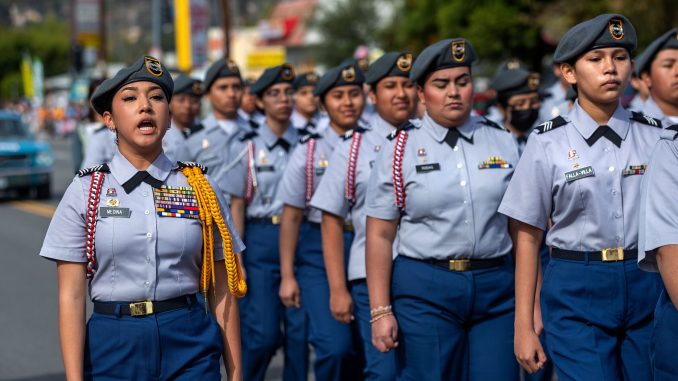
Based on allegations of sex abuse at the hands of instructors, Rep. Jackie Speier, D-Calif., late last y called on the Pentagon to “shut down” the Junior Reserve Officers Training Corps (JROTC) program.
That sentiment is echoed by critics who further claim JROTC “brainwashes” students with militarism and violence. By way of background, JROTC is a Defense Department program found in more than 3,500 U.S. high schools with the goals of instilling “the values of citizenship, service to the United States, personal responsibility, and sense of accomplishment” among high school students.
While even one sexual assault on a youth is too many, before JROTC is removed from schools, a bit of perspective is necessary.
Indeed, a full accounting would suggest America needs more—not fewer—JROTC programs in schools to help educators and parents develop better citizens and future leaders, and to allow more young Americans to access the benefits of the program. At a time when U.S. history and civics knowledge among American teenagers is in rapid decline, the education provided through JROTC is especially impactful.
Established just before World War I in 1916, the JROTC program is one of the largest character development and citizenship programs for youth in the world. Schools volunteer to host a JROTC program, and the instructors are retired or reserve U.S. military officers or noncommissioned officers.
According to a 2021 Rand Corp. study, students who complete all four years of JROTC are more likely to graduate high school than their non-JROTC peers. Those cadets also have higher grades, higher rates of attendance, and lower suspension rates compared with non-cadets.
JROTC cadets are also exposed to a curriculum of important life skills. Those include lessons on anti-bullying, conflict resolution, anger management, and team building. Contrary to the criticism that JROTC instills militarism in students, the program provides cadets with skills applicable in various aspects of life.
Although military training is a component of JROTC, the benefits of the course stretch far beyond the military.
Not only does JROTC teach practical life skills, but it also provides students with a valuable civics education. Civics education is especially important in the 21st century, as Americans become increasingly oblivious to even the most basic civics knowledge. In 2021, fewer than half of Americans could name all three branches of government, and only 24% could name freedom of religion as a constitutional right.
That ignorance likely leads to a lack of patriotism: Only 16% of Gen-Z Americans report feeling proud to live in the United States. Without patriotism, it will be difficult to maintain a strong country and collective national identity.
The civics education provided by JROTC fosters a better understanding of American democracy that is essential not only to the creation of more informed citizens, but also to support military recruiting as well. JROTC doesn’t recruit students to enlist; in fact, only 20% to 25% of JROTC students end up enlisting in the military. Rather, JROTC provides a foundational role in helping youth understand the importance of democracy and the role that the military plays in defending it.
JROTC also helps students understand more about what military life entails. According to the Military Times, although 73% of young Americans think they know what military life is like, they do not actually have that understanding.
Young Americans have inaccurate perceptions about various aspects of military life and benefits. Those range from the college tuition assistance and vocational training provided by military service all the way to the different careers offered by the military and the likelihood of seeing combat.
That lack of knowledge of the military plays a substantial role in the current recruiting crisis. The maintenance and expansion of JROTC can both create better citizens and increase enlistments through improved understanding of American democracy and the military.
Tragically, sexual assault in schools is a real problem. In 2022, nearly 350 public educators were arrested on child sex-related crimes in the U.S. The Pentagon reported that about 58 substantiated allegations of sexual abuse involving JROTC instructors have been lodged over the period 2018 to 2022, or fewer than 12 per year.
Indeed, JROTC instructors should be setting the example, not contributing to the problem. Recent reports of isolated sexual assaults suggest that more work needs to be done to protect students. First, there should be improved oversight and background checks for instructors. Currently, 16 states do not require any state certification for JROTC instructors. The Defense Department should require JROTC instructors to have certifications similar to other teachers in the state in which they are serving to help remove bad apples.
To that end, the military services are already making changes. For example, the Air Force is looking to hire more JROTC instructors per unit and increase oversight to increase accountability. Those reforms are very promising, and more safeguards for JROTC will only increase the integrity of the program.
Given the educational, civic, and national defense benefits delivered through JROTC, the program should be expanded to afford the opportunity to more young Americans. While there are legitimate concerns about issues such as sexual assault, banning the program is the wrong answer. Instead, the rare predatory instructors must be weeded out to ensure cadets get the benefits of JROTC while staying safe.
At a time when American society is in dire need of civics knowledge and patriotism, JROTC can provide that for America’s youth.
Have an opinion about this article? To sound off, please email letters@DailySignal.com and we’ll consider publishing your edited remarks in our regular “We Hear You” feature. Remember to include the url or headline of the article plus your name and town and/or state.

